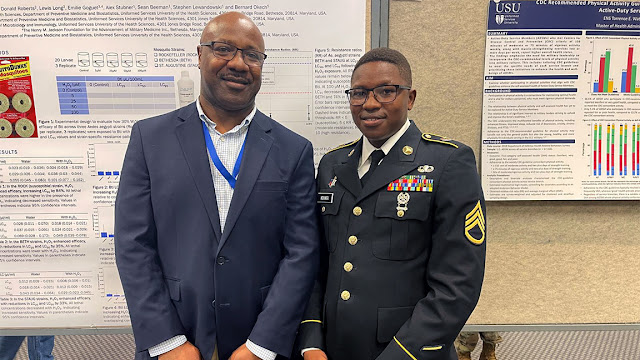From Basic Training to Breakthroughs: Army Enlisted Soldier Earns Ph.D. and Commission in Medical Entomology
Army Staff Sgt. Luka Ndungu becomes Uniformed Services University’s first active-duty enlisted Ph.D. graduate in Environmental Health Sciences, leading the way in military medical research to safeguard warfighter health.
 |
| Army Staff Sgt. Luka Ndungu (right) and his research advisor, Dr. Bernard Okech. (Photo credit: Luka Ndungu) |
July 30, 2025 by Claire Pak
Army Staff Sgt. Luka Ndungu’s journey from enlisted soldier to entomology researcher and soon-to-be Army officer is more than a personal achievement—it’s a powerful example of workforce development in action. This spring, Ndungu earned a Ph.D. in Environmental Health Sciences from the Uniformed Services University of the Health Sciences (USU), becoming the first active-duty enlisted service member to earn a doctoral degree in that field at USU.
Next stop: commissioning as a Captain in the Army Medical Service Corps and reporting to a military entomology lab in San Antonio, where his research will help protect warfighters from mosquito-borne illnesses that can cripple operations and endanger lives.
 |
Ndungu (center) with family and Dr. Althea Green-Dixon (left), former director of USU's EMDP2 program. (Photo credit: Luka Ndungu) |
His first assignment took him to Charlie Medical Company, 307th Brigade Support Battalion, 1st Brigade Combat Team, 82nd Airborne Division, where he served as a Behavioral Health Technician (BHT) and deployed to Kuwait in 2020 in support of Operation Inherent Resolve.
Ndungu found his work as a BHT rewarding, stating he could “make a real difference” in the mental health and well-being of individual soldiers. However, he found that environmental health research offered the opportunity to “protect military forces and improve public health more broadly.”
That realization launched Ndungu into graduate studies. Encouraged by Rooks, and his leadership at the 82nd Airborne Division, he completed a master’s degree at Florida Gulf Coast University, where he conducted research on cyanobacteria (harmful algal blooms) and their effects on public health.
He also began developing an interest in medical entomology—sparked by an undergraduate class at Eastern Kentucky and later confirmed through hands-on mosquito surveillance work with the Lee County Mosquito Control District in Florida.
Ndungu said, “That hands-on experience with mosquito surveillance deepened my interest in medical entomology and confirmed my desire to pursue it further.”
Ndungu joined USU’s Environmental Health Sciences degree program at the recommendation of Dr. Althea Green-Dixon, former director of the university’s Enlisted to Medical Degree Preparatory Program (EMDP2). At USU, under the mentorship of vector biology expert Dr. Bernard Okech, Ndungu completed research focused on how natural toxins produced by algae affect mosquitoes that transmit dengue, Zika, and other serious illnesses. His Ph.D. thesis dissertation was titled “The Influence of Cyanobacterial Metabolites on Aedes aegypti Life History Traits and Potential Control Strategies.”
“This work is particularly significant for the military,” Ndungu explained, “because troops deployed in tropical and subtropical regions face heightened risks from mosquito-borne diseases, which can undermine force health and operational readiness.”
“As Staff Sgt. Ndungu’s research supervisor, I observed his profound enthusiasm for mosquito research and his remarkable aptitude for applying this expertise to real-world situations,” Okech said, praising Ndungu’s dedication. “I could not have found a more energetic and enthusiastic individual to work in my lab. I am incredibly proud of his achievements and eagerly anticipate his continued excellence throughout his career.”
Ndungu’s story illustrates how the Department of Defense is cultivating talent from within—identifying promising enlisted service members and helping them grow into highly trained experts in science, medicine, and research.
“The support I received from USU shows that the military is invested in growing its own future leaders,” Ndungu said. “That’s how we stay ahead of emerging threats—by empowering people already in the force.”
He hopes his journey encourages other enlisted service members to consider nontraditional paths in science or medicine. “Never be afraid to be the first to pursue a path that few others have taken—never be afraid to lead change,” he said.
He also hopes to one day teach, mentor, and help shape the next generation of military scientists.
Ndungu reflected, “I keep in mind what my mentor, Lt. Col. Lewis Long always tells me: Flexibility is essential to serving effectively and meeting the mission.”




